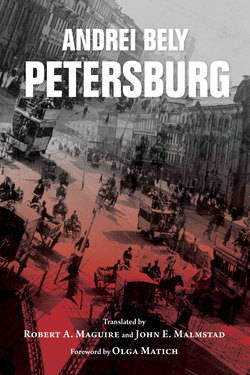Читать книгу Petersburg - Andrei Bely - Страница 31
На сайте Литреса книга снята с продажи.
WHAT COSTUMER?
ОглавлениеNikolai Apollonovich’s quarters consisted of a bedroom, a study, and a reception room.
The whole of the bedroom was occupied by an enormous bed. It was covered by a satin spread, with pillow covers.
The study was lined with oak shelves crammed with books, before which silk could be slid back on rings to reveal rows of leather bindings.
The furniture in the study was upholstered in dark green. There was a handsome bust of—it stands to reason—Kant.
For two years Nikolai Apollonovich had not risen before noon. For two and a half years before that, however, he had awakened at nine o’clock, and had appeared in a student uniform buttoned up to the neck.†
Then he did not walk around the house in a Bukhara dressing gown. A skullcap did not grace his oriental drawing room. Two and a half years ago Anna Petrovna, the mother of Nikolai Apollonovich and the spouse of Apollon Apollonovich, had abandoned the family hearth, inspired by an Italian singer.† It was after her flight with the singer that Nikolai Apollonovich appeared on the parquetry of the domestic hearth in a Bukhara dressing gown. The daily encounters over morning coffee broke off by themselves.
The senator partook of his coffee considerably earlier than did his son.
A dressing gown began to appear on Nikolai Apollonovich. Tartar slippers were introduced. A skullcap made its appearance.
Thus was a brilliant student transformed into an Oriental.
Nikolai Apollonovich had just received a letter in an unfamiliar hand, some pathetic doggerel with the striking signature: “A Soul Aflame.”
Nikolai Apollonovich began rushing about the room, looking for his spectacles, rummaging among books, quills, and pens.
“Oh!
“Damn it all!”
Nikolai Apollonovich, just like Apollon Apollonovich, talked to himself.
His movements were abrupt, like his papa’s movements. Like Apollon Apollonovich, he was distinguished by an unprepossessing stature and by restless eyes set in a smiling face. Whenever he sank into serious contemplation, his gaze grew rigid: the lines of his totally white countenance stood out dry, sharp and cold, iconlike. His most noble feature was his forehead, finely chiselled, with tiny swollen veins. The pulsation of the veins on his forehead was a sign of sclerosis.
The bluish veins matched the circles around his immense dark cornflower blue eyes (in moments of agitation, his eyes grew black: from dilation of the pupils).
Nikolai Apollonovich was wearing a Tartar skullcap. Were he to remove it, there would appear a thatch of fine flaxen white hair, which softened his cold, severe exterior, with its stamp of stubbornness. It is rare to find hair of such a shade on a grown man. This shade is often to be seen on infants, especially in White Russia.
Here, in his own room, Nikolai Apollonovich would truly grow into a self-contained center, into a series of logical premises that flowed from the center and predetermined thought, soul, and this very table. Here he was the sole center of the universe, conceivable as well as inconceivable.
This center made deductions.
But no sooner had Nikolai Apollonovich managed to set aside the trivia of daily life and the abysm of inapprehensibilities called the world and life, than inapprehensibility again burst in.
Nikolai Apollonovich tore himself away from his book:
“Well? . . .”
A muffled and deferential voice was heard:
“Someone is asking for you, sir.”
After locking himself in, and while reviewing the tenets of his system, which was being reduced to a unity step by step, he felt his body poured into “all,” while his head was displaced into the light bulb’s potbellied sphere of glass.
And having thus displaced himself, Nikolai Apollonovich would become a truly creative being.
He loved to lock himself in. And the rustle and tread of any intruder would shatter his consciousness.
So it was now.
“What is it?”
But a voice answered from afar:
“Someone has come.”
***
At this, Nikolai Apollonovich’s face assumed a satisfied expression:
“Ah, it’s someone from the costumer. The costumer has brought me my costume. . . .”
And gathering up the skirts of his dressing gown, he strode off in the direction of the door. At the balustrade of the staircase, he leaned over and shouted:
“Is that you?
“The costumer?”
What is this costumer business?
***
In Nikolai Apollonovich’s room a box appeared. Nikolai Apollonovich locked the door. He cut the string with great fuss. He lifted the top and took out of the box: a half-mask with a black lace beard, and after the mask, a luxuriant bright red domino† with folds that rustled.
Soon he was standing before the mirror, all satiny and red, holding the miniature half-mask over his face. The black lace of the beard fell away and back onto his shoulders, forming a fantastic wing on each side, right and left.
After this masquerade, Nikolai Apollonovich, an extremely satisfied expression on his face, put first the red domino and then the black half-mask back in the box.
